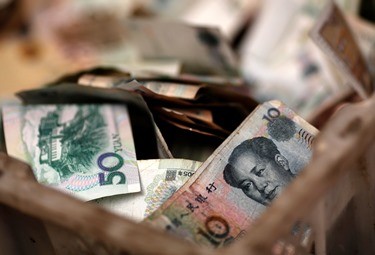China’s yuan or renminbi “is no longer undervalued,” the International Monetary Fund (IMF) said Tuesday, breaking its long-held stance that the Chinese currency is “modestly undervalued.”
The value of the yuan has been a source of tension for years, with China's major trade partners--particularly the United States--accusing the Chinese government of keeping it artificially low in order for Chinese exporters to have an unfair competitive advantage, a claim which Beijing denies.
"Our assessment now is that the substantial real effective appreciation over the past year has brought the exchange rate to a level that is no longer undervalued," the IMF said in a statement after a consultation mission in Beijing.
The IMF has previously labeled the yuan as "modestly undervalued," despite the currency's gradual appreciation since being reevaluated in 2005. Since then, the yuan has gained sharply against most non-dollar currencies, rising by 0.6 percent in the past 12 months.
David Lipton, the first deputy managing director of the IMF, stressed that the assessment is based on the current situation and subject to future changes.
"It is a judgment about this moment, and may change in the future," he said. "China's productivity is growing, and probably growing more rapidly than the rest of the world. Every currency has to adjust to the differentials in productivity."
Despite the yuan's appreciation, China's external position is still moderately stronger in terms of trade surplus than being consistent with medium-term fundamentals, Lipton said, adding that it underscores the need for policy reforms that reduce excess savings and provide sustained external balance.
"We believe that China should aim to achieve an effective floating exchange rate within two to three years," the statement said.
The comments came as China is pushing to have the yuan included in the IMF's Special Drawing Rights basket of reserve currencies before the fund makes a decision in October.
The Chinese government has been slowly relaxing its controls on the international use of the yuan, with the currency now among the top 10 held as reserves by foreign countries. Beijing has also set up yuan clearing agreements with 10 countries and regions and signed currency swap agreements with 28 central banks.
The IMF said that it welcomes and shares China's objectives and will work closely with Chinese officials in this regard. The inclusion is not a matter of "but" but "when," IMF managing director Christine Lagarde said.
Asked to identify the potential risks for China's economy, Lipton noted the excess in credit and investment, rising nonperforming loans, and inadequate corporate governance in the state-owned enterprise (SOE) sector, which led to irresponsible borrowings, or what economists described as "soft budget restraints."
The IMF urged Beijing to "break the web of implicit guarantees" prevalent throughout the country's financial system. Though admitting it cannot be accomplished overnight, the process will "start and will involve greater acceptance of defaults and bankruptcies."
The IMF also called for the government to level the playing field between SOEs and private companies, noting that progress on SOE reform has been too slow.
China should step up fiscal support for its economy if growth falls below 6.5 percent this year, the Fund said. The IMF expects China's economic growth to be at 6.8 percent this year, before slowing down to 6.25 percent in 2016.
"If incoming data suggest that growth is likely to exceed 7 percent, the authorities should take advantage of the opportunity to reduce vulnerabilities faster," the IMF said. "If instead growth looks set to dip below 6.5 percent, then fiscal policy should be eased."



























